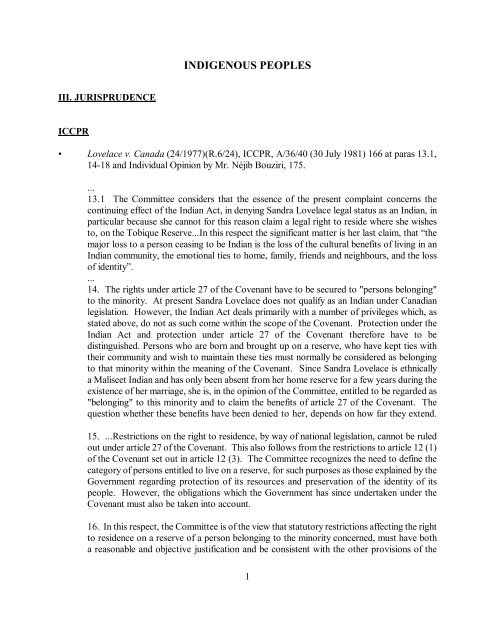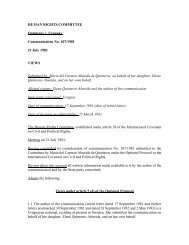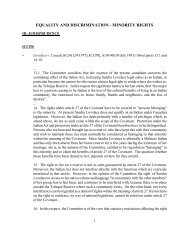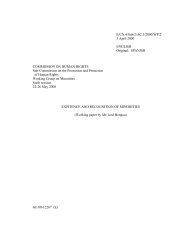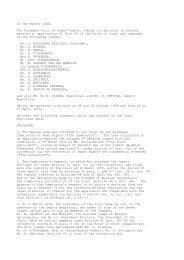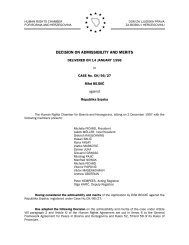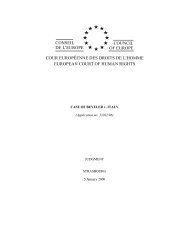summary in .pdf - Javier Leon Diaz
summary in .pdf - Javier Leon Diaz
summary in .pdf - Javier Leon Diaz
Create successful ePaper yourself
Turn your PDF publications into a flip-book with our unique Google optimized e-Paper software.
INDIGENOUS PEOPLES<br />
III. JURISPRUDENCE<br />
ICCPR<br />
• Lovelace v. Canada (24/1977)(R.6/24), ICCPR, A/36/40 (30 July 1981) 166 at paras 13.1,<br />
14-18 and Individual Op<strong>in</strong>ion by Mr. Néjib Bouziri, 175.<br />
...<br />
13.1 The Committee considers that the essence of the present compla<strong>in</strong>t concerns the<br />
cont<strong>in</strong>u<strong>in</strong>g effect of the Indian Act, <strong>in</strong> deny<strong>in</strong>g Sandra Lovelace legal status as an Indian, <strong>in</strong><br />
particular because she cannot for this reason claim a legal right to reside where she wishes<br />
to, on the Tobique Reserve...In this respect the significant matter is her last claim, that “the<br />
major loss to a person ceas<strong>in</strong>g to be Indian is the loss of the cultural benefits of liv<strong>in</strong>g <strong>in</strong> an<br />
Indian community, the emotional ties to home, family, friends and neighbours, and the loss<br />
of identity”.<br />
...<br />
14. The rights under article 27 of the Covenant have to be secured to "persons belong<strong>in</strong>g"<br />
to the m<strong>in</strong>ority. At present Sandra Lovelace does not qualify as an Indian under Canadian<br />
legislation. However, the Indian Act deals primarily with a number of privileges which, as<br />
stated above, do not as such come with<strong>in</strong> the scope of the Covenant. Protection under the<br />
Indian Act and protection under article 27 of the Covenant therefore have to be<br />
dist<strong>in</strong>guished. Persons who are born and brought up on a reserve, who have kept ties with<br />
their community and wish to ma<strong>in</strong>ta<strong>in</strong> these ties must normally be considered as belong<strong>in</strong>g<br />
to that m<strong>in</strong>ority with<strong>in</strong> the mean<strong>in</strong>g of the Covenant. S<strong>in</strong>ce Sandra Lovelace is ethnically<br />
a Maliseet Indian and has only been absent from her home reserve for a few years dur<strong>in</strong>g the<br />
existence of her marriage, she is, <strong>in</strong> the op<strong>in</strong>ion of the Committee, entitled to be regarded as<br />
"belong<strong>in</strong>g" to this m<strong>in</strong>ority and to claim the benefits of article 27 of the Covenant. The<br />
question whether these benefits have been denied to her, depends on how far they extend.<br />
15. ...Restrictions on the right to residence, by way of national legislation, cannot be ruled<br />
out under article 27 of the Covenant. This also follows from the restrictions to article 12 (1)<br />
of the Covenant set out <strong>in</strong> article 12 (3). The Committee recognizes the need to def<strong>in</strong>e the<br />
category of persons entitled to live on a reserve, for such purposes as those expla<strong>in</strong>ed by the<br />
Government regard<strong>in</strong>g protection of its resources and preservation of the identity of its<br />
people. However, the obligations which the Government has s<strong>in</strong>ce undertaken under the<br />
Covenant must also be taken <strong>in</strong>to account.<br />
16. In this respect, the Committee is of the view that statutory restrictions affect<strong>in</strong>g the right<br />
to residence on a reserve of a person belong<strong>in</strong>g to the m<strong>in</strong>ority concerned, must have both<br />
a reasonable and objective justification and be consistent with the other provisions of the<br />
1
INDIGENOUS PEOPLES<br />
Covenant, read as a whole. Article 27 must be construed and applied <strong>in</strong> the light of the other<br />
provisions mentioned above, such as articles 12, 17 and 23 <strong>in</strong> so far as they may be relevant<br />
to the particular case, and also the provisions aga<strong>in</strong>st discrim<strong>in</strong>ation, such as articles 2, 3 and<br />
26, as the case may be. It is not necessary, however, to determ<strong>in</strong>e <strong>in</strong> any general manner<br />
which restrictions may be justified under the Covenant, <strong>in</strong> particular as a result of marriage,<br />
because the circumstances are special <strong>in</strong> the present case.<br />
17. The case of Sandra Lovelace should be considered <strong>in</strong> the light of the fact that her<br />
marriage to a non-Indian has broken up. It is natural that <strong>in</strong> such a situation she wishes to<br />
return to the environment <strong>in</strong> which she was born, particularly as after the dissolution of her<br />
marriage her ma<strong>in</strong> cultural attachment aga<strong>in</strong> was to the Maliseet band. Whatever may be the<br />
merits of the Indian Act <strong>in</strong> other respects, it does not seem to the Committee that to deny<br />
Sandra Lovelace the right to reside on the reserve is reasonable, or necessary to preserve the<br />
identity of the tribe. The Committee therefore concludes that to prevent her recognition as<br />
belong<strong>in</strong>g to the band is an unjustifiable denial of her rights under article 27 of the Covenant,<br />
read <strong>in</strong> the context of the other provisions referred to.<br />
18. In view of this f<strong>in</strong>d<strong>in</strong>g, the Committee does not consider it necessary to exam<strong>in</strong>e<br />
whether the same facts also show separate breaches of the other rights <strong>in</strong>voked...The rights<br />
to choose one's residence (article 12), and the rights aimed at protect<strong>in</strong>g family life and<br />
children (articles 17, 23 and 24) are only <strong>in</strong>directly at stake <strong>in</strong> the present case. The facts<br />
of the case do not seem to require further exam<strong>in</strong>ation under those articles.<br />
Individual Op<strong>in</strong>ion ... of Mr. Nejib Bouziri:<br />
In the Lovelace case, not only article 27 but also articles 2 (para. 1), 3, 23 (paras. 1 and 4)<br />
and 26 of the Covenant have been breached, for some of the provisions of the Indian Act are<br />
discrim<strong>in</strong>atory, particularly as between men and women. The Act is still <strong>in</strong> force and, even<br />
though the Lovelace case arose before the date on which the Covenant became applicable<br />
<strong>in</strong> Canada, Mrs. Lovelace is still suffer<strong>in</strong>g from the adverse discrim<strong>in</strong>atory effects of the Act<br />
<strong>in</strong> matte/s other than that covered by article 27.<br />
• Kitok v. Sweden (197/1985), ICCPR, A/43/40 (27 July 1988) 221 at paras. 9.1-9.8.<br />
...<br />
9.1 The ma<strong>in</strong> question before the Committee is whether the author of the communication<br />
is the victim of a violation of article 27 of the Covenant because, as he alleges, he is<br />
arbitrarily denied immemorial rights granted to the Sami community, <strong>in</strong> particular, the right<br />
to membership of the Sami community and the right to carry out re<strong>in</strong>deer husbandry. In<br />
decid<strong>in</strong>g whether or not the author of this communication has been denied the right to “enjoy<br />
[his] own culture”, as provided for <strong>in</strong> article 27 of the Covenant, and whether section 12,<br />
2
INDIGENOUS PEOPLES<br />
paragraph 2, of the 1971 Re<strong>in</strong>deer Husbandry Act, under which an appeal aga<strong>in</strong>st a decision<br />
of a Sami community to refuse membership may only be granted if there are special reasons<br />
for allow<strong>in</strong>g such membership, violates article 27 of the Covenant, the Committee bases its<br />
f<strong>in</strong>d<strong>in</strong>gs on the follow<strong>in</strong>g considerations.<br />
9.2 The regulation of an economic activity is normally a matter for the State alone.<br />
However, where that activity is an essential element <strong>in</strong> the culture of an ethnic community,<br />
its application to an <strong>in</strong>dividual may fall under article 27 of the Covenant...<br />
9.3 ...[T]he right to enjoy one’s own culture <strong>in</strong> community with the other members of the<br />
group cannot be determ<strong>in</strong>ed <strong>in</strong> abstracto but has to be placed <strong>in</strong> context. The Committee is<br />
thus called upon to consider statutory restrictions affect<strong>in</strong>g the right of an ethnic Sami to<br />
membership of a Sami village.<br />
9.4 With regard to the State party’s argument that the conflict <strong>in</strong> the present case is not so<br />
much between a conflict between the author as a Sami and the State party, but rather<br />
between the author and the Sami community...[T]he Committee observes that the State<br />
party’s responsibility has been engaged, by virtue of the adoption of the Re<strong>in</strong>deer Husbandry<br />
Act of 1971, and that it is therefore State action that has been challenged...[A] decision of<br />
the Sami community to refuse membership can only be granted if there are special reasons<br />
for allow<strong>in</strong>g such membership;...<br />
9.5 Accord<strong>in</strong>g to the State party, the purposes of the Re<strong>in</strong>deer Husbandry Act are to restrict<br />
the number of re<strong>in</strong>deer breeders for economic and ecological reasons and to secure the<br />
preservation and well-be<strong>in</strong>g of the Sami m<strong>in</strong>ority. Both parties agree that effective measures<br />
are required to ensure the future of re<strong>in</strong>deer breed<strong>in</strong>g and the livelihood of those for whom<br />
re<strong>in</strong>deer farm<strong>in</strong>g is the primary source of <strong>in</strong>come. The method selected by the State party<br />
to secure these objectives is the limitation of the right to engage <strong>in</strong> re<strong>in</strong>deer breed<strong>in</strong>g to<br />
members of the Sami villages. The Committee is of the op<strong>in</strong>ion that all these objectives and<br />
measures are reasonable and consistent with article 27 of the Covenant.<br />
9.6 The Committee has none the less had grave doubts as to whether certa<strong>in</strong> provisions of<br />
the Re<strong>in</strong>deer Husbandry Act, and their application to the author, are compatible with Article<br />
27 of the Covenant...<br />
9.7 ...[T]he Act provides certa<strong>in</strong> criteria for participation <strong>in</strong> the life of an ethnic m<strong>in</strong>ority<br />
whereby a person who is ethnically a Sami can be held not to be a Sami for the purposes of<br />
the Act. The Committee has been concerned that the ignor<strong>in</strong>g of objective ethnic criteria <strong>in</strong><br />
determ<strong>in</strong><strong>in</strong>g membership of a m<strong>in</strong>ority, and the application to Mr. Kitok of the designated<br />
rules, may have been disproportionate to the legitimate ends sought be the legislation. It has<br />
further noted that Mr. Kitok has always reta<strong>in</strong>ed some l<strong>in</strong>ks with the Sami community,<br />
always liv<strong>in</strong>g on Sami lands and seek<strong>in</strong>g to return to full-time re<strong>in</strong>deer farm<strong>in</strong>g as soon as<br />
3
INDIGENOUS PEOPLES<br />
it became f<strong>in</strong>ancially possible...for him to do so.<br />
9.8 In resolv<strong>in</strong>g this problem, <strong>in</strong> which there is an apparent conflict between the legislation,<br />
which seems to protect the rights of the m<strong>in</strong>ority as a whole, and its application to a s<strong>in</strong>gle<br />
member of that m<strong>in</strong>ority, the Committee has been guided by the ratio decidendi <strong>in</strong> the<br />
Lovelace case (No. 24/1977, Lovelace v. Canada), namely, that a restriction upon the right<br />
of an <strong>in</strong>dividual member of a m<strong>in</strong>ority must be shown to have a reasonable and objective<br />
justification and to be necessary for the cont<strong>in</strong>ued viability and welfare of the m<strong>in</strong>ority as<br />
a whole. After a careful review of all the elements <strong>in</strong>volved <strong>in</strong> this case, the Committee is<br />
of the view that there is no violation of article 27 by the State party...<br />
• Om<strong>in</strong>ayak v. Canada (167/1984), ICCPR, A/45/40 vol. II (26 March 1990) 1 at paras. 32.2<br />
and 33.<br />
...<br />
32.2 Although <strong>in</strong>itially couched <strong>in</strong> terms of alleged breaches of the provisions of article 1<br />
of the Covenant, there is no doubt that many of the claims presented raise issues under article<br />
27. The Committee recognizes that the rights protected by article 27, <strong>in</strong>clude the right of<br />
persons, <strong>in</strong> community with others, to engage <strong>in</strong> economic and social activities which are<br />
part of the culture of the community to which they belong.<br />
...<br />
33. Historical <strong>in</strong>equities...and certa<strong>in</strong> more recent developments threaten the way of life and<br />
culture of the Lubicon Lake Band and constitute a violation of article 27 so long as they<br />
cont<strong>in</strong>ue.<br />
For dissent<strong>in</strong>g op<strong>in</strong>ion <strong>in</strong> this context, see Om<strong>in</strong>ayak v. Canada (167/1984), ICCPR, A/45/40 vol.<br />
II (26 March 1990) 1 at Individual Op<strong>in</strong>ion by Mr. Nisuke Ando, 28.<br />
See also:<br />
• R. L. et al. v. Canada (358/1989), ICCPR, A/47/40 (5 November 1991) 358<br />
(CCPR/C/43/D/358/1989).<br />
• Mikmaq Tribal Society v. Canada (205/1986), ICCPR, A/47/40 (4 November 1991) 205<br />
(CCPR/C/43/D/205/1986) at paras. 5.4, 5.5 and 6.<br />
...<br />
5.4 It rema<strong>in</strong>s to be determ<strong>in</strong>ed what is the scope of the right of every citizen, without<br />
unreasonable restrictions, to take part <strong>in</strong> the conduct of public affairs, directly or through<br />
freely chosen representatives. Surely, it cannot be the mean<strong>in</strong>g of article 25(a) of the<br />
4
INDIGENOUS PEOPLES<br />
Covenant that every citizen may determ<strong>in</strong>e either to take part directly <strong>in</strong> the conduct of<br />
public affairs or to freely chosen representatives. It is for the legal and constitutional system<br />
of the State party to provide for the modalities of such participation.<br />
5.5 It must be beyond dispute that the conduct of public affairs <strong>in</strong> a democratic State is the<br />
task of representatives of the people, elected for that purpose, and public officials appo<strong>in</strong>ted<br />
<strong>in</strong> accordance with the law. Invariably, the conduct of public affairs affects the <strong>in</strong>terest of<br />
large segments of the population or even the population as a whole, while <strong>in</strong> other <strong>in</strong>stances<br />
it affects more directly the <strong>in</strong>terests of more specific groups <strong>in</strong> society. Although prior<br />
consultations, such as public hear<strong>in</strong>gs or consultations with the most <strong>in</strong>terested groups may<br />
often be envisaged by law or have evolved as public policy <strong>in</strong> the conduct of public affairs,<br />
article 25(a) cannot be understood as mean<strong>in</strong>g that any directly affected group, large or<br />
small, has the unconditional right to choose the modalities of participation <strong>in</strong> the conduct of<br />
public affairs. That, <strong>in</strong> fact, would be an extrapolation of the right to direct participation by<br />
the citizens, far beyond the scope of article 25 (a).<br />
6. Notwithstand<strong>in</strong>g the right of every citizen to take part <strong>in</strong> the conduct of public affairs<br />
without discrim<strong>in</strong>ation and without unreasonable restrictions, the Committee concludes that,<br />
<strong>in</strong> the specific circumstances of the present case, the failure of the State party to <strong>in</strong>vite<br />
representatives of the Mikmaq tribal society to the constitutional conferences on aborig<strong>in</strong>al<br />
matters, which constituted conduct of public affairs, did not <strong>in</strong>fr<strong>in</strong>ge that right of the authors<br />
or other members of the Mikmaq tribal society. Moreover, <strong>in</strong> the view of the Committee,<br />
the participation and representation at these conferences have not been subjected to<br />
unreasonable restrictions. Accord<strong>in</strong>gly, the Committee is of the view that the<br />
communication does not disclose a violation of article 25 or any other provisions of the<br />
Covenant.<br />
• Länsman v. F<strong>in</strong>land (511/1992), ICCPR, A/50/40 vol. II (26 October 1994) 66<br />
(CCPR/C/52/D/511/1992) at paras. 9.1-9.8 and 10.<br />
...<br />
9.1 ...The issue to be determ<strong>in</strong>ed by the Committee is whether quarry<strong>in</strong>g on the flank of Mt.<br />
Etelä-Riutusvaara, <strong>in</strong> the amount that has taken place until the present time or <strong>in</strong> the amount<br />
that would be permissible under the permit issued to the company which has expressed its<br />
<strong>in</strong>tention to extract stone from the mounta<strong>in</strong> (i.e. up to a total of 5,000 cubic metres), would<br />
violate the authors' rights under article 27 of the Covenant.<br />
9.2 It is undisputed that the authors are members of a m<strong>in</strong>ority with<strong>in</strong> the mean<strong>in</strong>g of article<br />
27 and as such have the right to enjoy their own culture; it is further undisputed that re<strong>in</strong>deer<br />
husbandry is an essential element of their culture. In this context, the Committee recalls that<br />
economic activities may come with<strong>in</strong> the ambit of article 27, if they are an essential element<br />
5
of the culture of an ethnic community.5/<br />
INDIGENOUS PEOPLES<br />
9.3 The right to enjoy one’s culture cannot be determ<strong>in</strong>ed <strong>in</strong> abstracto but has to be placed<br />
<strong>in</strong> context. In this connection, the Committee observes that article 27 does not only protect<br />
traditional means of livelihood of national m<strong>in</strong>orities, as <strong>in</strong>dicated <strong>in</strong> the State party’s<br />
submission. Therefore that the authors may have adapted their methods of re<strong>in</strong>deer herd<strong>in</strong>g<br />
over the years and practice it with the help of modern technology does not prevent them<br />
from <strong>in</strong>vok<strong>in</strong>g article 27 of the Covenant. Furthermore, mounta<strong>in</strong> Riutusvaara cont<strong>in</strong>ues to<br />
have a spiritual significance relevant to their culture. The Committee also notes the concern<br />
of the authors that the quality of slaughtered re<strong>in</strong>deer could be adversely affected by a<br />
disturbed environment.<br />
9.4 A State may understandably wish to encourage development or allow economic activity<br />
by enterprises. The scope of its freedom to do so is not to be assessed by reference to a<br />
marg<strong>in</strong> of appreciation, but by reference to the obligations it has undertaken <strong>in</strong> article 27.<br />
Article 27 requires that a member of a m<strong>in</strong>ority shall not be denied his right to enjoy his<br />
culture. Thus, measures whose impact amount to a denial of the right will not be compatible<br />
with the obligations under article 27. However, measures that have a certa<strong>in</strong> limited impact<br />
on the way of life of persons belong<strong>in</strong>g to a m<strong>in</strong>ority will not necessarily amount to a denial<br />
of the right under article 27.<br />
9.5 The question that therefore arises <strong>in</strong> this case is whether the impact of the quarry<strong>in</strong>g on<br />
Mount Riutusvaara is so substantial that it does effectively deny to the authors the right to<br />
enjoy their cultural rights <strong>in</strong> that region. The Committee recalls paragraph 7 of its General<br />
Comment on article 27, accord<strong>in</strong>g to which m<strong>in</strong>orities or <strong>in</strong>digenous groups have a right to<br />
the protection of traditional activities such as hunt<strong>in</strong>g, fish<strong>in</strong>g or, as <strong>in</strong> the <strong>in</strong>stant case,<br />
re<strong>in</strong>deer husbandry, and that measures must be taken "to ensure the effective participation<br />
of members of m<strong>in</strong>ority communities <strong>in</strong> decisions which affect them".<br />
9.6 Aga<strong>in</strong>st this background, the Committee concludes that quarry<strong>in</strong>g on the slopes of Mt.<br />
Riutusvaara, <strong>in</strong> the amount that has already taken place, does not constitute a denial of the<br />
authors' right, under article 27, to enjoy their own culture. It notes <strong>in</strong> particular that the<br />
<strong>in</strong>terests of the Muotkatunturi Herdsmens' Committee and of the authors were considered<br />
dur<strong>in</strong>g the proceed<strong>in</strong>gs lead<strong>in</strong>g to the delivery of the quarry<strong>in</strong>g permit, that the authors were<br />
consulted dur<strong>in</strong>g the proceed<strong>in</strong>gs, and that re<strong>in</strong>deer herd<strong>in</strong>g <strong>in</strong> the area does not appear to<br />
have been adversely affected by such quarry<strong>in</strong>g as has occurred.<br />
9.7 As far as future activities which may be approved by the authorities are concerned, the<br />
Committee further notes that the <strong>in</strong>formation available to it <strong>in</strong>dicates that the State party's<br />
authorities have endeavoured to permit only quarry<strong>in</strong>g which would m<strong>in</strong>imize the impact on<br />
any re<strong>in</strong>deer herd<strong>in</strong>g activity <strong>in</strong> Southern Riutusvaara and on the environment; the <strong>in</strong>tention<br />
to m<strong>in</strong>imize the effects of extraction of stone from the area on re<strong>in</strong>deer husbandry is<br />
6
INDIGENOUS PEOPLES<br />
reflected <strong>in</strong> the conditions laid down <strong>in</strong> the quarry<strong>in</strong>g permit. Moreover, it has been agreed<br />
that such activities should be carried out primarily outside the period used for re<strong>in</strong>deer<br />
pastur<strong>in</strong>g <strong>in</strong> the area. Noth<strong>in</strong>g <strong>in</strong>dicates that the change <strong>in</strong> herd<strong>in</strong>g methods by the<br />
Muotkatunturi Herdsmens' Committee...could not be accommodated by the local forestry<br />
authorities and/or the company.<br />
9.8 With regard to the authors' concerns about future activities, the Committee notes that<br />
economic activities must, <strong>in</strong> order to comply with article 27, be carried out <strong>in</strong> a way that the<br />
authors cont<strong>in</strong>ue to benefit from re<strong>in</strong>deer husbandry. Furthermore, if m<strong>in</strong><strong>in</strong>g activities <strong>in</strong> the<br />
Angeli area were to be approved on a large scale and significantly expanded by those<br />
companies to which exploitation permits have been issued, then this may constitute a<br />
violation of the authors' rights under article 27, <strong>in</strong> particular of their right to enjoy their own<br />
culture. The State party is under a duty to bear this <strong>in</strong> m<strong>in</strong>d when either extend<strong>in</strong>g exist<strong>in</strong>g<br />
contracts or grant<strong>in</strong>g new ones.<br />
10. The Human Rights Committee...is of the view that the facts as found by the Committee<br />
do not reveal a breach of Article 27 or any other provision of the Covenant.<br />
______________________________<br />
Notes<br />
...<br />
5/ Views on communication No.197/1985 (Kitok v. Sweden), adopted on 27 July 1988, para.<br />
9.2.<br />
______________________________<br />
• Länsman v. F<strong>in</strong>land (671/1995), ICCPR, A/52/40 vol. II (30 October 1996) 191<br />
(CCPR/C/58/D/671/1995) at paras. 10.5-10.7.<br />
...<br />
10.5 After careful consideration of the material placed before it by the parties, and duly<br />
not<strong>in</strong>g that the parties do not agree on the long-term impact of the logg<strong>in</strong>g activities already<br />
carried out and planned, the Committee is unable to conclude that the activities carried out<br />
as well as approved constitute a denial of the authors' right to enjoy their own culture. It is<br />
uncontested that the Muotkatunturi Herdsmen's Committee, to which the authors belong, was<br />
consulted <strong>in</strong> the process of draw<strong>in</strong>g up the logg<strong>in</strong>g plans and <strong>in</strong> the consultation, the<br />
Muotkatunturi Herdsmen's Committee did not react negatively to the plans for logg<strong>in</strong>g. That<br />
this consultation process was unsatisfactory to the authors and was capable of greater<br />
<strong>in</strong>teraction does not alter the Committee's assessment. It transpires that the State party's<br />
authorities did go through the process of weigh<strong>in</strong>g the authors' <strong>in</strong>terests and the general<br />
economic <strong>in</strong>terests <strong>in</strong> the area specified <strong>in</strong> the compla<strong>in</strong>t when decid<strong>in</strong>g on the most<br />
appropriate measures of forestry management, i.e. logg<strong>in</strong>g methods, choice of logg<strong>in</strong>g areas<br />
and construction of roads <strong>in</strong> these areas. The domestic courts considered specifically<br />
7
INDIGENOUS PEOPLES<br />
whether the proposed activities constituted a denial of article 27 rights. The Committee is<br />
not <strong>in</strong> a position to conclude, on the evidence before it, that the impact of logg<strong>in</strong>g plans<br />
would be such as to amount to a denial of the authors' rights under article 27 or that the<br />
f<strong>in</strong>d<strong>in</strong>g of the Court of Appeal affirmed by the Supreme Court, mis<strong>in</strong>terpreted and/or<br />
misapplied article 27 of the Covenant <strong>in</strong> the light of the facts before it.<br />
10.6 As far as future logg<strong>in</strong>g activities are concerned, the Committee observes that on the<br />
basis of the <strong>in</strong>formation available to it, the State party's forestry authorities have approved<br />
logg<strong>in</strong>g on a scale which, while result<strong>in</strong>g <strong>in</strong> additional work and extra expenses for the<br />
authors and other re<strong>in</strong>deer herdsmen, does not appear to threaten the survival of re<strong>in</strong>deer<br />
husbandry. That such husbandry is an activity of low economic profitability is not, on the<br />
basis of the <strong>in</strong>formation available, a result of the encouragement of other economic activities<br />
by the State party <strong>in</strong> the area <strong>in</strong> question, but of other, external, economic factors.<br />
10.7 The Committee considers that if logg<strong>in</strong>g plans were to be approved on a scale larger<br />
than that already agreed to for future years <strong>in</strong> the area <strong>in</strong> question or if it could be shown that<br />
the effects of logg<strong>in</strong>g already planned were more serious than can be foreseen at present,<br />
then it may have to be considered whether it would constitute a violation of the authors' right<br />
to enjoy their own culture with<strong>in</strong> the mean<strong>in</strong>g of article 27. The Committee is aware, on the<br />
basis of earlier communications, that other large scale exploitations touch<strong>in</strong>g upon the<br />
natural environment, such as quarry<strong>in</strong>g, are be<strong>in</strong>g planned and implemented <strong>in</strong> the area<br />
where the Sami people live. Even though <strong>in</strong> the present communication the Committee has<br />
reached the conclusion that the facts of the case do not reveal a violation of the rights of the<br />
authors, the Committee deems it important to po<strong>in</strong>t out that the State party must bear <strong>in</strong> m<strong>in</strong>d<br />
when tak<strong>in</strong>g steps affect<strong>in</strong>g the rights under article 27, that though different activities <strong>in</strong><br />
themselves may not constitute a violation of this article, such activities, taken together, may<br />
erode the rights of Sami people to enjoy their own culture.<br />
• Hopu v. France (549/1993), ICCPR, A/52/40 vol. II (29 July 1997) 70<br />
(CCPR/C/60/D/549/1993) at paras. 10.2 and 10.3.<br />
...<br />
10.2 The authors claim that they were denied access to an <strong>in</strong>dependent and impartial<br />
tribunal, <strong>in</strong> violation of article 14, paragraph 1. In this context, they claim that the only<br />
tribunals that could have had competence to adjudicate land disputes <strong>in</strong> French Polynesia are<br />
<strong>in</strong>digenous tribunals and that these tribunals ought to have been made available to them. The<br />
Committee observes that the authors could have brought their case before a French tribunal,<br />
but that they deliberately chose not to do so, claim<strong>in</strong>g that French authorities should have<br />
kept <strong>in</strong>digenous tribunals <strong>in</strong> operation. The Committee observes that the dispute over<br />
ownership of the land was disposed of by the Tribunal of Papeete <strong>in</strong> 1961 and that the<br />
decision was not appealed by the previous owners. No further step was made by the authors<br />
8
INDIGENOUS PEOPLES<br />
to challenge the ownership of the land, nor its use, except by peaceful occupation. In these<br />
circumstances, the Committee concludes that the facts before it do not disclose a violation<br />
of article 14, paragraph 1.<br />
10.3 The authors claim that the construction of the hotel complex on the contested site<br />
would destroy their ancestral burial grounds, which represent an important place <strong>in</strong> their<br />
history, culture and life, and would arbitrarily <strong>in</strong>terfere with their privacy and their family<br />
lives, <strong>in</strong> violation of articles 17 and 23. They also claim that members of their family are<br />
buried on the site. The Committee observes that the objectives of the Covenant require that<br />
the term "family" be given a broad <strong>in</strong>terpretation so as to <strong>in</strong>clude all those compris<strong>in</strong>g the<br />
family as understood <strong>in</strong> the society <strong>in</strong> question. It follows that cultural traditions should be<br />
taken <strong>in</strong>to account when def<strong>in</strong><strong>in</strong>g the term "family" <strong>in</strong> a specific situation. It transpires from<br />
the authors' claims that they consider the relationship to their ancestors to be an essential<br />
element of their identity and to play an important role <strong>in</strong> their family life. This has not been<br />
challenged by the State party; nor has the State party contested the argument that the burial<br />
grounds <strong>in</strong> question play an important role <strong>in</strong> the authors' history, culture and life. The State<br />
party has disputed the authors' claim only on the basis that they have failed to establish a<br />
k<strong>in</strong>ship l<strong>in</strong>k between the rema<strong>in</strong>s discovered <strong>in</strong> the burial grounds and themselves. The<br />
Committee considers that the authors' failure to establish a direct k<strong>in</strong>ship l<strong>in</strong>k cannot be held<br />
aga<strong>in</strong>st them <strong>in</strong> the circumstances of the communication, where the burial grounds <strong>in</strong><br />
question pre-date the arrival of European settlers and are recognized as <strong>in</strong>clud<strong>in</strong>g the<br />
forbears of the present Polynesian <strong>in</strong>habitants of Tahiti. The Committee therefore concludes<br />
that the construction of a hotel complex on the authors' ancestral burial grounds did <strong>in</strong>terfere<br />
with their right to family and privacy. The State party has not shown that this <strong>in</strong>terference<br />
was reasonable <strong>in</strong> the circumstances, and noth<strong>in</strong>g <strong>in</strong> the <strong>in</strong>formation before the Committee<br />
shows that the State party duly took <strong>in</strong>to account the importance of the burial grounds for<br />
the authors, when it decided to lease the site for the build<strong>in</strong>g of a hotel complex. The<br />
Committee concludes that there has been an arbitrary <strong>in</strong>terference with the authors' right to<br />
family and privacy, <strong>in</strong> violation of articles 17, paragraph 1, and 23, paragraph 1.<br />
For dissent<strong>in</strong>g op<strong>in</strong>ions <strong>in</strong> this context, see Hopu v. France (549/1993), ICCPR, A/52/40 vol. II<br />
(29 July 1997) 70 (CCPR/C/60/D/549/1993) at Individual Op<strong>in</strong>ion by David Kretzmer and<br />
Thomas Buergenthal, Nisuke Ando and Lord Colville, 81 at paras. 1-7.<br />
• Arhuacos v. Colombia (612/1995), ICCPR, A/52/40 vol. II (29 July 1997) 173<br />
(CCPR/C/60/D/612/1995) at paras. 8.3-8.5 and 9.<br />
...<br />
8.3 In respect of the alleged violation of article 6, paragraph 1, the Committee observes that<br />
decision No. 006/1992 of the Human Rights Division of 27 April 1992 clearly established<br />
the responsibility of State agents for the disappearance and subsequent death of the three<br />
9
INDIGENOUS PEOPLES<br />
<strong>in</strong>digenous leaders. The Committee accord<strong>in</strong>gly concludes that, <strong>in</strong> these circumstances, the<br />
State party is directly responsible for the disappearance and subsequent murder of Luis<br />
Napoleón Torres Crespo, Angel María Torres Arroyo and Antonio Hugues Chaparro Torres,<br />
<strong>in</strong> violation of article 6 of the Covenant.<br />
8.4 As to the claim under article 7 <strong>in</strong> respect of the three <strong>in</strong>digenous leaders, the Committee<br />
has noted the results of the autopsies, and also the death certificates, which revealed that the<br />
<strong>in</strong>digenous leaders had been tortured prior to be<strong>in</strong>g shot <strong>in</strong> the head. Given the circumstances<br />
of the abduction of Mr. Luis Napoleón Torres Crespo, Mr. Angel María Torres Arroyo and<br />
Mr. Antonio Hugues Chaparro Torres, together with the results of the autopsies and the lack<br />
of <strong>in</strong>formation from the State party on that po<strong>in</strong>t, the Committee concludes that Mr. Luis<br />
Napoleón Torres Crespo, Mr. Angel María Torres Arroyo and Mr. Antonio Hugues Chaparro<br />
Torres were tortured after their disappearance, <strong>in</strong> violation of article 7.<br />
8.5 As to the Villafañe brothers' claim under article 7, the Committee has noted the<br />
conclusions conta<strong>in</strong>ed <strong>in</strong> the decision of 27 April 1992, to the effect that the brothers were<br />
subjected to ill-treatment by soldiers from the No. 2 Artillery Battalion "La Popa", <strong>in</strong>clud<strong>in</strong>g<br />
be<strong>in</strong>g bl<strong>in</strong>dfolded and dunked <strong>in</strong> a canal. The Committee concludes that José Vicente and<br />
Amado Villafañe were tortured, <strong>in</strong> violation of article 7 of the Covenant.<br />
...<br />
9. The Human Rights Committee...is of the view that the facts before it reveal a violation<br />
by the State party...of articles 6, 7 and 9 of the Covenant <strong>in</strong> the case of the three leaders Luis<br />
Napoleón Torres Crespo, Angel María Torres Arroyo and Antonio Hugues Chaparro Torres.<br />
10


